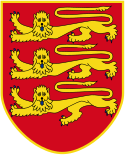States of Jersey | |
|---|---|
 Coat of arms of Jersey | |
| Polity type | Unitary parliamentary democratic constitutional monarchy |
| Legislative branch | |
| Name | States Assembly |
| Type | Unicameral |
| Meeting place | States Chamber |
| Presiding officer | Timothy Le Cocq, Bailiff |
| Executive branch | |
| Head of state | |
| Title | Monarch |
| Currently | King Charles III |
| Appointer | Hereditary |
| Head of government | |
| Title | Chief Minister |
| Currently | Lyndon Farnham |
| Cabinet | |
| Name | Council of Ministers |
| Headquarters | Broad Street Offices |
| Ministries | 9 |

The Bailiwick of Jersey is a British Crown dependency, unitary state and parliamentary representative democracy and constitutional monarchy. The head of the civil administration and judiciary is the Bailiff Timothy Le Cocq, while the Chief Minister Lyndon Farnham is the head of government. The current monarch and head of state is King Charles III.
Legislative and executive power is vested in the States of Jersey,[1] which is composed of the Assembly of States members (States Assembly, French: Assemblé des États). Elected States members appoint the Council of Ministers (including the Chief Minister and other Ministers), which is the decision-making body of the island's government, the Government of Jersey.[2]
Other powers are exercised by the Connétable and Parish Assembly in each of the twelve parishes.
| Politics of Jersey |
|---|
 |
| Category |
As one of the Crown dependencies, Jersey is sovereign territory of the Crown, but is not part of the United Kingdom. Jersey can be best described as "neither a colony nor a conquest, but a peculiar and immediate dependency of the Crown."[3] The island is part of the British Islands, a political term encompassing the United Kingdom and the Crown Dependencies.[4] This island is for the most part self-governing, with its own independent legal, administrative and fiscal systems.[5]
The link between the island and the monarchy, rather than through Parliament, has led to an effectively independent political development on the island. In medieval times, the island was treated as a possession of the King by the English government, rather than part of the English state.[6]
- ^ [/laws/current/Pages/16.800.aspx "States of Jersey Law 2005"]. Jersey Legal Information Board.
{{cite web}}: Check|url=value (help) - ^ "Council of Ministers adopts 'Government of Jersey' identity" (Press release). States of Jersey. 7 February 2019. Archived from the original on 10 February 2019. Retrieved 9 February 2019.
- ^ Le Bailli, J. (1860) Jersey Chamber of Commerce, quoted in Kelleher, John D. (1991). The rural community in nineteenth century Jersey (Thesis). S.l.: typescript. Archived from the original on 28 March 2021. Retrieved 21 March 2021. p. 5
- ^ "Interpretation Act 1978 SCHEDULE 1". legislation.gov.uk. Government of the United Kingdom. Archived from the original on 27 March 2023. Retrieved 24 October 2019.
- ^ House of Commons Justice Committee (23 March 2010). Crown Dependencies (PDF). Vol. 8th Report of Session 2009–10. London, United Kingdom: The Stationery Office. p. 52. ISBN 978-0-215-55334-8. Archived from the original (PDF) on 25 July 2017. Retrieved 8 September 2017.
- ^ Kelleher, John D. (1991). The rural community in nineteenth century Jersey (Thesis). S.l.: typescript. Archived from the original on 28 March 2021. Retrieved 21 March 2021.